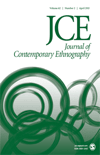
JOURNAL OF CONTEMPORARY ETHNOGRAPHY
metrics 2024
Illuminating Cultural Interactions in Today's World
Introduction
JOURNAL OF CONTEMPORARY ETHNOGRAPHY, an esteemed publication by SAGE PUBLICATIONS INC, is a leading journal that delves into the rich and dynamic field of ethnographic research. With a strong focus on anthropology, linguistics, sociology, and urban studies, this journal offers insights that are crucial for understanding contemporary social dynamics and cultural interactions. Established in 1972 and publishing continuously through significant eras of social change, the journal boasts an impressive Q1 ranking across multiple categories in the 2023 Scimago metrics, reflecting its prominence in the academic community. The journal holds a significant position, ranked #118 in Language and Linguistics and #67 in Anthropology within Scopus, showcasing its relevance and impact on both theory and practice. With no open access option, the journal dedicates itself to high-quality, peer-reviewed research that informs scholars and practitioners alike, underlining its importance as a reference point for advancing discussions in contemporary ethnography.
Metrics 2024
 0.65
0.65 1.60
1.60 1.60
1.60 64
64Metrics History
Rank 2024
Scopus
IF (Web Of Science)
JCI (Web Of Science)
Quartile History
Similar Journals

Studia Ethnologica Croatica
Illuminating Cultural Practices through Scholarly DiscourseStudia Ethnologica Croatica is a distinguished open-access journal dedicated to the fields of ethnology and cultural anthropology, published by the University of Zagreb's Faculty of Humanities and Social Sciences. Since its inception in 1989, the journal has provided a platform for scholarly discourse and critical analysis of cultural practices, social structures, and ethnographic research pertinent to Croatia and beyond. With an impressive Q2 ranking in Cultural Studies and a strengthening presence in Anthropology (Q3), the journal is essential for researchers and practitioners alike, contributing significantly to ongoing discussions within these disciplines. Recognized on Scopus with notable rankings, it represents a valuable resource for those seeking to deepen their understanding of contemporary ethnological issues. The journal operates under an open access model, ensuring that its high-quality research is freely accessible to a global audience, thereby fostering collaboration and inspiring new inquiries within the social sciences.
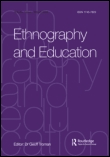
Ethnography and Education
Fostering Inclusivity Through Ethnographic InquiryEthnography and Education is a prominent academic journal dedicated to the exploration of the dynamic interplay between cultural practices and educational contexts. Published by Routledge Journals, Taylor & Francis Ltd, this esteemed journal holds a significant position within the academic community, as evidenced by its Q1 ranking in Cultural Studies and Q2 rankings in both Education and Gender Studies for 2023. With an ISSN of 1745-7823 and E-ISSN of 1745-7831, the journal focuses on innovative ethnographic research methodologies that illuminate how cultural dynamics shape educational experiences. This research is critical for scholars, educators, and policymakers aiming to enhance pedagogical practices and foster inclusivity across learning environments. The journal's commitment to high-quality, peer-reviewed content makes it an essential resource for those keen on engaging with contemporary issues in education enriched by cultural insights. While lacking an open access option, its influence is supported by impressive Scopus rankings, including 185th out of 1304 in Cultural Studies, further underlining its importance in the scholarly discourse. For researchers, educators, and students, Ethnography and Education offers a rich repository of knowledge essential for advancing understanding in the fields of education and cultural studies.

Cultura y Religion
Unveiling the cultural dimensions of religious practices.Cultura y Religión is a pioneering academic journal dedicated to exploring the intersections of culture and religion within various socio-cultural contexts. Published by the Universidad Arturo Prat's Instituto de Estudios Indígenas, this journal has been an invaluable resource for researchers, professionals, and students since its inception, adopting an Open Access model since 2007 to enhance the dissemination of knowledge. With an ISSN of 0718-5472 and an E-ISSN of 0718-4727, this journal aims to provide a multidisciplinary platform for the examination of religious practices, beliefs, and their cultural implications, particularly in indigenous contexts. Situated in Iquique, Tarapacá, Chile, Cultura y Religión plays a critical role in enriching the academic discourse and fostering a deeper understanding of the cultural dimensions of religion, making it a must-read for those invested in cultural studies, anthropology, and religious studies.
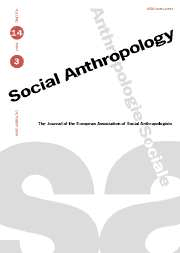
Social Anthropology
Fostering Insight into Anthropological LandscapesSocial Anthropology is a leading journal published by BERGHAHN JOURNALS, focusing on the diverse and dynamic field of anthropology. With an ISSN of 0964-0282 and an E-ISSN of 1469-8676, this open-access journal has been a cornerstone of scholarly communication since its inception in 1982, becoming fully accessible to the public since 2022. Situated in the United States, the journal aims to disseminate high-quality research that explores sociocultural dimensions of human behavior across various contexts, addressing pressing contemporary issues through a multidisciplinary lens. With impressive rankings, including Q2 in Anthropology and Arts and Humanities, and strong positions in Sociology and Developmental Psychology according to Scopus metrics, Social Anthropology serves as an essential platform for researchers, professionals, and students committed to advancing our understanding of social practices and cultural norms. Its commitment to fostering intellectual discourse makes it a vital resource for those seeking to deepen their knowledge and insight into the anthropological landscape.
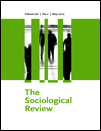
SOCIOLOGICAL REVIEW
Shaping contemporary inquiry through rigorous scholarship.Sociological Review is a premier journal in the field of sociology and political science, published by SAGE Publications Ltd and holding a prestigious Q1 ranking as of 2023. With its rich legacy dating back to 1908, this journal serves as a vital platform for disseminating cutting-edge research and critical discourse that shapes contemporary sociological and political inquiry. Based in the United Kingdom, it offers insights into diverse social theories, empirical studies, and pressing societal issues, appealing to researchers, professionals, and students alike. Although not an open-access journal, it maintains a strong impact within the academic community, reflected in its Scopus ranking of #266 out of 1466 in the Social Sciences category, positioning it in the 81st percentile. Through its commitment to high-quality scholarship and intellectual debate, the Sociological Review continues to influence both academia and policy, making it an essential resource for those seeking to engage with the complexities of society.

ANTHROPOS
Exploring contemporary issues through an anthropological lens.ANTHROPOS is a distinguished journal published by NOMOS VERLAGSGESELLSCHAFT MBH & CO KG, anchoring its academic presence in Switzerland since its inception in 1983. With a commitment to advancing the fields of Anthropology and Arts and Humanities, this peer-reviewed publication serves as a vital platform for scholarly research, providing critical insights and fostering dialogue among researchers, professionals, and students alike. ANTHROPOS is categorized in Q3 for both Anthropology and the broader Arts and Humanities domains as of 2023, indicating its reputable yet emerging presence within these disciplines. Despite its significant contributions, the journal currently does not feature open access options, urging readers to engage through traditional academic channels. By embracing interdisciplinary approaches and contemporary issues, ANTHROPOS aims to illuminate complex cultural phenomena, making it an essential resource for anyone dedicated to understanding the intricacies of human societies.

Journal of Urban Ethnology
Fostering Interdisciplinary Dialogues on Urban LifeJournal of Urban Ethnology, published by the Polish Academy of Sciences, Institute of Archaeology & Ethnology, is a premier scholarly journal focused on the multifaceted dimensions of urban life through an ethnographic lens. With a commitment to advancing the field of urban studies, this journal welcomes original research articles, case studies, and theoretical discussions that explore the rich tapestry of urban communities, cultural practices, and social dynamics. The journal plays a crucial role in fostering interdisciplinary dialogue among anthropologists, sociologists, urban planners, and cultural researchers, making it an invaluable resource for professionals, students, and scholars alike. While it currently operates under a traditional access model, the journal strives to contribute to an understanding of contemporary urban challenges and innovations, supporting the quest for sustainable and equitable urban futures. The ISSN for the journal is 1429-0618, ensuring its recognition in global academic databases.

Gazeta de Antropologia
Exploring Cultures, Enriching Minds.Gazeta de Antropologia is an esteemed open-access journal dedicated to the field of anthropology, published by the ASOC GRANADINA ANTROPOLOGIA in Spain. Since its inception in 1982, this journal has provided a platform for scholarly research, fostering a global discourse on human cultures and social practices. With an ISSN of 2340-2792, it operates under an open-access model, ensuring that all research is freely accessible to readers worldwide. The journal has been acknowledged in the Scopus Rankings, positioned at #412 out of 502 within the Social Sciences category of anthropology, reflecting its commitment to disseminating high-quality research despite its current Q4 quartile ranking. As it converges its efforts from 2012 to 2024, Gazeta de Antropologia aims to engage researchers, professionals, and students alike, enriching the anthropological landscape through a diverse array of articles that contribute to the understanding of cultural dynamics and social structures.

Visual Ethnography
Unlocking the Power of Visual Narratives in AnthropologyVisual Ethnography, published by UNIV BASILICATA, is an innovative academic journal dedicated to the interdisciplinary exploration of visual methodologies within the realms of Anthropology, Communication, and Cultural Studies. With a notable emphasis on visual ethnographic practices, this journal serves as an essential platform for researchers, professionals, and students aiming to bridge the gap between visual representation and cultural analysis. Since its inception in 2012, Visual Ethnography has contributed significantly to the academic discourse, despite its current positioning in the lower quartiles of its field as evidenced by its Scopus rankings. The journal actively engages its audience by providing open access options, ensuring that scholarship in visual culture is available to a wider community. With the academic landscape continually evolving, Visual Ethnography remains a vital resource for those seeking to understand the complexities of culture through a visual lens in the context of today’s globalized society.
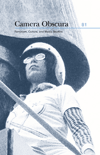
CAMERA OBSCURA
Engaging with the Visual: A Gendered ApproachCAMERA OBSCURA, an esteemed journal published by DUKE UNIVERSITY PRESS, serves as a vital platform at the intersection of Visual Arts and Gender Studies. With its ISSN 0270-5346 and E-ISSN 1529-1510, this journal has been an influential contributor to critical discussions in cultural theory and visual culture from 2002 to 2024. Notably categorized in the Q4 quartile for Gender Studies and Q2 for Visual Arts and Performing Arts in 2023, CAMERA OBSCURA boasts a Scopus rank that reflects its growing impact within the academic community. Although currently not offered as an open-access publication, its rigorous peer-reviewed content remains crucial for researchers, professionals, and students alike, facilitating a deeper understanding of how visual representation shapes and is shaped by societal constructs. Set in the heart of the United States, the journal's commitment to exploring the complexities of gendered visuality emphasizes its importance within contemporary scholarship in these vibrant fields.